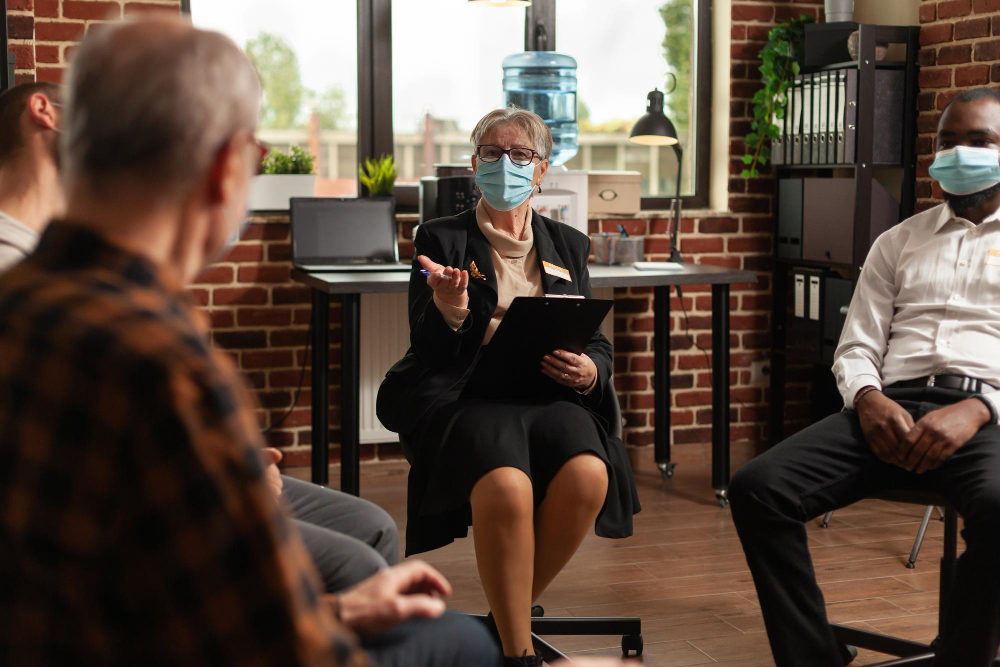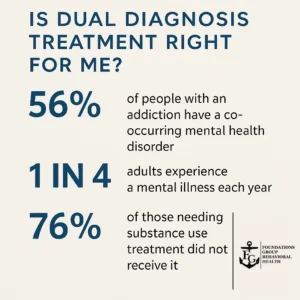When Sobriety Feels Quiet—and Not in a Good Way
Early recovery can feel like stepping into a world that doesn’t quite know you yet. The noise of drinking or using is gone, but the silence it leaves behind is deafening. If you’re here—sober for the first time, hurting, and wondering why things still feel off—you’re not doing it wrong. You might just need support that looks a little different.
Many people discover in early sobriety that there’s more going on beneath the surface—pain they never named, feelings that were numbed, and mental health struggles they didn’t know how to recognize. That’s where dual diagnosis treatment comes in.
It’s not an “extra” level of care. It’s not a label. It’s a way to feel less alone inside your own mind.
What Is Dual Diagnosis Treatment?
Dual diagnosis treatment is a clinical approach designed to help people who are living with both a substance use disorder and a mental health condition at the same time. It’s not rare. In fact, it’s more common than most people realize.
For many, substance use becomes a way to cope with overwhelming symptoms like anxiety, depression, trauma flashbacks, or mood swings. It makes sense—until it stops working and starts hurting. That’s when dual diagnosis care steps in: to help treat both the symptom and the source, together.
At Foundations Group Behavioral Health in Cape Cod, we use this integrated model to support clients through recovery that honors the full picture—not just the part that’s loudest.
Why Might I Need This If It’s My First Time Getting Sober?
Because sometimes the drinking or drug use isn’t the whole story. It might have started to help you sleep, or to stop the panic, or to feel something after months of feeling numb. And now that it’s gone, everything you were using it to manage comes roaring back.
If you’re in early recovery and struggling with:
- Lingering sadness or emotional flatness
- Anxiety that hits without warning
- Flashbacks or nightmares
- Feeling numb, distant, or disconnected
- Racing thoughts or severe mood swings
…it might not just be post-acute withdrawal. It could be that your mind is finally trying to speak up now that it’s not being quieted.
How Does Dual Diagnosis Treatment Work in Early Recovery?
In a good dual diagnosis program, you’re not treated like a diagnosis. You’re met as a whole person. Care starts with where you are—scared, raw, unsure—and builds a path forward that tends to both your mental health and your sobriety.
At Foundations Group in Cape Cod, this might include:
- Psychiatric evaluation (only if you’re ready)
- Therapy that focuses on trauma, anxiety, or depression
- Medication support if appropriate
- A care team that checks in on both substance use and emotional health
- A space to say, “I don’t feel okay,” and be taken seriously
And if you’re looking for dual diagnosis treatment in Barnstable County or seeking support in Falmouth, we’re here—local, experienced, and never in a rush.
Do I Have to Have a Diagnosis Already?
Absolutely not.
You don’t need the right words or labels to deserve help. One of the most common misconceptions about dual diagnosis care is that you have to show up with paperwork or a clear idea of what you’re dealing with.
The truth? You can show up with nothing but a knot in your chest and a sense that something isn’t right.
Our team is trained to listen for what’s underneath—not to pathologize it, but to help you name it, understand it, and work through it.
Isn’t Regular Addiction Treatment Enough?
For some people, yes. But for others, stopping the substance doesn’t fix the pain—it just reveals it. That doesn’t mean you’re broken. It means you’re human.
Traditional recovery models often focus primarily on sobriety. Dual diagnosis care takes a step further and asks: Why did substances feel necessary in the first place? What was being treated, silenced, or survived through use?
When that part gets attention, recovery doesn’t just mean abstinence. It starts to mean healing.
What If I’m Scared I’ll Be Overwhelmed?
Then it’s working. That fear is real—and it means you’re stepping into something important.
At Foundations Group, we know that early recovery is a time when the world can feel painfully sharp. We don’t ask you to be brave all the time. We just ask you to stay open enough to let someone walk beside you.
You’re not expected to fix everything right away. You’re allowed to heal slowly, with support.
FAQ: Common Questions About Dual Diagnosis Treatment
Do I need medication to be in dual diagnosis care?
No. Medication may be part of treatment if it feels right for you, but it’s never forced. Many people benefit from therapy and structure alone, especially early on.
What if I’m not sure I have a mental health issue?
That’s okay. Dual diagnosis care is designed to explore that gently. There’s no pressure to accept a label—just space to be honest about what you’re feeling and whether it’s manageable.
Can I do this locally in Cape Cod?
Yes. We offer dual diagnosis treatment right here in Cape Cod, MA, with accessible care for residents of Barnstable County and Falmouth. You don’t have to travel far to find help that understands both your mental health and your recovery.
Is dual diagnosis care just for “serious” cases?
No. If you’re newly sober and even wondering if mental health might be part of the picture, that’s enough. You don’t need a crisis to deserve care.
How do I start?
It starts with a call. We’ll listen, answer your questions, and help you decide what support fits best. There’s no pressure—just a real conversation.
📞 Ready to Talk?
Call 888-685-9730 or visit our Cape Cod program page to learn more about our dual diagnosis treatment services. Whether you’re confused, exhausted, or just trying to stay sober one day at a time—we’re here to help.









